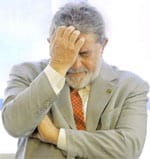Brazil

|
|
|
Prompted partly by the political uncertainty that has forced the departure of several government officials and partly by first-quarter 2005s meager 0.3% GDP growth, Brazilian companies are taking a more cautious approach to capital investments during the second half of the year. Foreign investment could make up for the shortfall, though, with FDI up 112% in first-half 2005 to $8.6 billion. The central bank, however, predicts full-year FDI of just $16 billiondown from 2004s $18.2 billion.
The political turmoil was blamed for weakened demand for an IPO by Energias do Brasil, a So Paulo-based power company, which raised $474 million but saw shares priced at $7.72well below the $9.40-to-$12.00 target. On the fixed-income front, however, issuers have placed nearly $4 billion abroad since the scandal broke, tapping global investors seeking higher yields. The government jumped on the same bandwagon, swapping $4.4 billion of 8% C-bonds due 2014 for longer-dated paper maturing in 2018 as part of a plan to slash financing costs.
Ratings agency Standard & Poors sounds an optimistic note for Brazil, commenting that the political situation should not hurt the administrations solid fundamentals, although it is likely to delay passage of controversial legislation or reforms. S&P;, which rates the sovereign at BB- with a stable outlook, says such potential setbacks have already been factored into the rating. The ratings, however, do assume continued commitment to prudent macroeconomic policy by the current and future governments and appropriate and adequate policy response to internal or external shocks, says S&P; credit analyst Lisa Schineller. The rating and/or outlook, she adds, could be affected if the administrations policy commitment were to falter.
Antonio Guerrero



